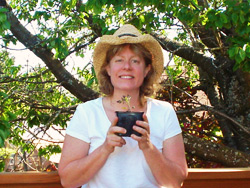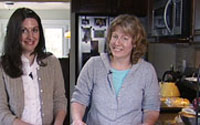I (Lisa) grew up in northwest Arkansas, just a generation or two removed from the family farm. Although it was not the primary source of income, my grandparents and parents devoted considerable land to producing food for the family table. One of my grandfathers had a “truck patch” in addition to the family garden…literally, extra produce that he sold off the back end of a truck for extra cash. My mother as well as grandmothers and aunts on both sides of the family were great cooks and experts at preserving the harvest: jams, jellies, sauces, pickles galore, blanching and freezing, drying, you name it. Every year we (my parents and me) planted a huge classic Southern garden— tomatoes, peppers, okra, beans, potatoes, peas, corn, melons, collard greens, mustard greens, lettuces, cucumbers, summer and winter squash, zucchini, onions. We went to U-Pick farms for peaches, strawberries and blueberries. We foraged for blackberries, spring dandelions and poke sallet greens, huckleberries, persimmons, wild grapes, morels and hickory nuts. We’d visit a local mill for stone ground corn meal and flours to supplement grocery store dry goods.
From the time I could walk and have my toes in the dirt, I knew food came from a real place and required effort to obtain. I helped clear land and condition the flinty soil to make a garden, making the acquaintance of whatever snake or critters lived there in the process. I planted seeds and starts, weeded and watered, harvested while snacking, cleaned, cut up, blanched, skimmed the foam from the preserves, put the wax on the jars, sucked the air out of the freezer bags of green beans with a straw, and got covered with ticks and chiggers from picking something out in the woods. Eating wasn’t just about filling my belly–it was learning, it was adventure, it was work, it was a reward and it was fun.
There was nothing I did not eat as a kid. I believe it is the fact that I was exposed to so many foods very early and consistently with parents who ate most everything with gusto that made me unafraid, even excited, to try new things, especially if I helped grow it. Perhaps learning to eat is just like learning a foreign language, most easily accomplished when the mind is still malleable. Of course, there will always be foods kids don’t like the first time or even the first year they try it. And really picky eaters may possess a genetic predisposition to that tendency from their parents—but that doesn’t mean they will never change or grow as eaters if you don’t give up on them. Young palates need time to mature: the early devotion to the safely sweet and salty generally expands slowly to an appreciation of bitter and sour components. This may be built in to keep toddlers from doing themselves in on toxic substances. Certain textures may remain forever revolting to some: oysters and okra are not for everyone. Food allergies are a real and significant issue for some children and adults. An excellent overview the subject of picky eaters including when to really worry and why can be found at Parenting magazine. All said, however, giving your child the opportunity to grow and help prepare something that makes it to the dinner table, makes a huge difference in their adult attitudes to food. (Check out a variety of studies that prove this point at this University of Minnesota research links page.)
If you have access to even a tiny plot (3’ by 5’) plot of land or a sunny porch and some pots, you can grow a surprisingly large amount of food pretty easily as described in this basic primer on How to Start a Vegetable Garden. If you’ve got more space and want to convert some sunny lawn into a vegetable garden, check out the more detailed info at Weekend Gardener. If you have neither the time, inclination, space, nor money to grow food at home, consider lobbying for a Farm to School program as described in Cooking Up a Story’s conversation with Marion Kalb (Farm To School: A Conversation with Marion Kalb) or exploring the programs and data at kidsgardening.org.
Next week: hear about my visit with Rebeca Siplak, Program Coordinator of the Oregon Food Bank’s Learning Gardens as TwoJunes examine once again the notion that access to fresh whole foods and the opportunity to connect with the growing process is a privilege that isn’t available easily to us all. Our excellent and much-imitated Food Bank is reaching out with programs that teach best gardening practices to interested communities, including an innovative program for at-risk youth taught in the Food Bank’s own Learning Garden, Cultivating Community. This program allows the youth to simply “be” in a garden for a measure of time in their highly stressful lives, letting them connect to the natural world in addition to learning from gardening mentors and helping out with chores like harvesting. Until then, send us your stories.
Lisa Bell is a freelance producer, writer and editor. She spent the first fifteen years of her working life as a pastry chef, recipe developer, test kitchen director, food stylist and print editor. She has also taught cooking classes, run a small cooking school, and worked as a food scientist. Nicole Rees currently works as a baking scientist. She is also a food writer and cookbook author specializing in baking science. Her most recent book Baking Unplugged, is filled with simple, scratch recipes that require no electric gadgets beyond an oven.



